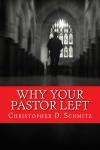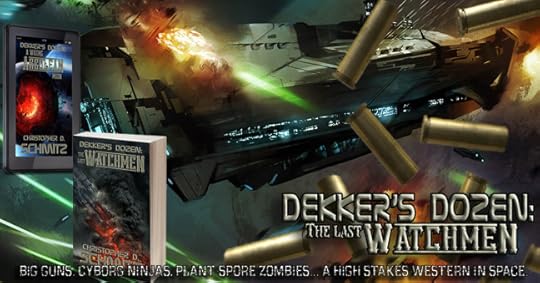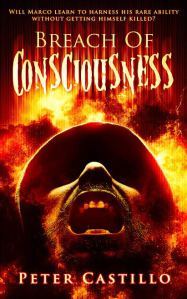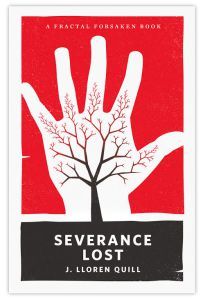Christopher D. Schmitz's Blog, page 48
December 12, 2016
The Shack Movie rant + State of Writing

People are mean. It’s a good reminder I suppose. I think I might be fed up enough with Goodreads to avoid it, however. It feels like its overrun with keyboard warriors with a bone to pick against Christian works. Had another 2-star, discouraging review of Why Your Pastor Left. The reviewer obviously didn’t read it very close, didn’t understand the topic, or is part of the problem that plagues ministers (he disputed that pastors should be well-paid and actually claimed they work only 6-8 hours a week at most! This is literally the exact opposite of what I demonstrate in the book… was a real facepalm moment… I know I’m ranting atm, but it feels good and it’s my blog. I do what I want–it’s how I process my emotions. Reviewer was quite upset that the book was not a linear narrative of why my pastor left and thus called my work editorially disorganized and a mess even though it goes ch1-the problem, ch2-why there’s a problem, ch3+ ten specific, topical areas to address, an alternative point of view chapter, and a final chapter on summation/remediation… but whatever. I’m thinking a Pinneapple Apple Pen mock video is in order. I can imagine it now “I have an opinion… I have an internet… keyboard warrior!”) rant over
just kidding, not really. I went about my business and saw that “Christians” are trying to flex their social muscle against The Shack movie, calling it blasphemy. Give me a break you guys. Quit beating a dead horse and telling everyone what not to do–as a movement contemporary Christianity has delved too dangerously into social and cultural politics and left behind what they ought to be doing: genuinely pursuing God and seeking individual revival. If the world went dark then your light would shine all that much brighter–it is not your job to make the rest of the world bright. We do not make fellow Christians, the only job of a Believer is to present their faith, not try and effect outward conformity to our beliefs! It is the job of the Holy Spirit to move on the hearts of the nonbeliever and bring about repentance and growth. We merely have a part in that through proclaiming the Gospel (the true Gospel, not our version of it,) and guiding eventual growth through discipleship. So you don’t like exactly how the allegory that is The Shack plays out because it is not solid theology. SO WHAT! It is not a theological movie! It is a story that is a stepping-off point towards sharing our faith. Why would we want to destroy those opportunities that present themselves and invite open dialogue of the real Gospel (I admit that The Shack isn’t an evangelistic piece–and that’s OKAY! For crying out loud, we can use almost anything–even secular things–to present the message of the Cross. Because Christians are write now writing refutations [we only read/listen to respond these days, not to understand,] I will give an example an example from scripture. Acts 17, Paul uses even A PAGAN GOD to present Jesus. I know, I know…that was just an analogy. Fine, move to verse 28 where Paul literally quotes a popular secular poet (the anachronistic equivalent of twitter celeb/movie-star) in order to bridge that gap, using a quote from an ungodly pagan’s text to make his point and illustrate a point. It was a launching point to present the Gospel.)
Christians are just as nasty as the secularists and atheists who troll Goodreads to tear down Christian books (yes, it’s a thing). I had one of them mid-week; he tried to trash me on the comments section of my book advert because I write faith-based SF/F as if God can not use a whole genre (which was invented by a Christian, FYI–see John Bunyan). He went as far as publicly calling me a false shepherd.
Maybe the whole light and darkness comparison is what we are afraid of! If lukewarm, semi-light Christians were surrounded by actual darkness they would be FORCED to shine bright and truly live out what they claim… by contrast, if the rest of the world were genuinely converted to real light their relative dimness would become painfully evident and so forcing that lukewarmness/mild incandescence onto the surrounding culture shows them in a good light. Come on people. Let’s get real and start being okay with being a light in the darkness.
(That last sentence does not mean we desire darkness and the fact that I feel it necessary to throw in that caveat/correction disturbs me. Christians, stop tearing down other people working on behalf of the Kingdom.) Paul was willing to go to Mars Hill because he knew what it was like to be unsaved (though he had been religious all his life) and so he was willing to do what it took to present a case for Jesus to the gentiles of Athens. When we really understand the consequences of living in darkness we will do whatever it takes to shine that light–even if it means knowing and using secular culture, writing, movies, etc. It might even include science fiction, fantasy, or comic books. Get over it. God can use anything for his glory. Even you.
#rantover
Now onto my typical State of Writing post I do on Mondays.
So I had many late nights. Last week I promised I’d do at least three chapters in Fear in a Land Without Shadows. If I would’ve made that goal, I’d have edited half of Part 1 (of 3). I blew past it and edited more than half of the book over several late evenings. I also wrote a few articles for the local newspaper and wrote an encouragement article for a church planters on a large website/hub at their request. I plan to do about a half dozen for them. I also hope to have Fear in a Land Without Shadows edited into a relatively polished draft by New Years. I’ll be seeking beta readers and an editor around that time and hope to pitch agents in Feb.


December 9, 2016
Great Review Online of Why Your Pastor Left


Networking with other authors and bloggers is paramount! A fellow blogger asked for a copy of my nonfiction book and I obliged. The result is a very nice analysis of the book from my someone in my target audience. I invite you to check out the review and subscribe to April Yamasaki’s blog:
https://whenyouworkforthechurch.com/2016/12/08/life-in-the-fishbowl-and-why-your-pastor-left/


December 8, 2016
20 Signs You’re a Sci-fi Reader
 When you’re done with this blog, go get a shiny new copy of Dekker’s Dozen
When you’re done with this blog, go get a shiny new copy of Dekker’s Dozenquick disclaimer, I totally lifted the idea from Author J.S.Morrin’s blog post 20 Signs You’re a Fantasy Reader (http://www.jsmorin.com/2013/11/20-signs-youre-fantasy-reader)
If you’re like me and have read a ton of science fiction from the golden age and beyond then you’ve probably internalized enough of those tropes to make you feel as appealing as a scruffy looking nerf herder. Here are my top 20 that I literally jotted down in a spare 10 minutes.
1. If you ever got mad at the Halo franchise for not calling it a Niven ring.
2. If the topic Star Wars vs Star Trek has ever been listed as “off limits” during a social gathering.
3. When people skeptically looked at your junky, first car you replied “She may not look like much, but she’s got it where it counts, kid.”
4. You own a high quality replica tricorder, sonic screwdriver, or any other handheld SF film device.
5. You avoid any shirt more than 80% red
6. You already know what color your lightsaber blade should be (bonus points if you’ve ever sketched out the handle).
7. You only allow references to Nathan Fillion as Captain Mal.
8. Driving through snowy weather is always referred to as Hyperspace.
9. You’ve ever tried to give a secret message in binary code.
10. You and your friends have had serious discussions about the science and practicality of lasers.
12. You make Battlestar Galactica references every time you go to Starbucks.
13. The word Quark conjures up at least two mental images.
14. You’ve engaged in 10+minutes worth of debate over why Jar Jar has ruined everything holy.
15. Not only do you know what the acronym TARDIS stands for, but you have a fierce opinion about which actor was the best Doctor
16. You have a preference for which type of Mech or a class of starcraft you’d like to pilot.
17. You draw political parallels and advice from Babylon 5.
18. You have a cosplay costume hanging in your closet right now and are actively seeking excuses to don it.
19. You know more than a little about xenomorph biology, predator culture, or the weyland yutani corporation.
20. You know any words in klingon.
Have a favorite on this list or something else to add? Let me know in the comments!


December 6, 2016
Review: Breach of Consciousness

Breach of Consciousness is something like Rob Zombie writes an episode of X-files. It is the debut novel by Peter Castillo and it follows Marco Torres who, from a young age, understands that there is something horrific and wrong with himself—he sees visions, for one thing, from an early age. Eventually he finds solidarity in the discovery that he is not alone and Marco’s new friends pull him into a world where the government would harness his rare gifts. All the right pieces are there for a great plot which unfolds at rapid-fire rate.
If you enjoy thrillers or loose espionage with a hint of the supernatural then this would be a good read for you. You can pick it up here: http://www.amazon.com/dp/B01HFLA7GS


December 5, 2016
State of Writing
Last week I edited down two chapter of Fear in a Land Without Shadows and sent out some query letters for John in the John. I also laid out some plans to run a table at MN’s largest comicon.
I’m aiming for three more chapters edited this week. I picked up again last week and rediscovered that this next book is a monster. A very exciting monster… and editing it is pretty easy–writing is pretty tight. Maybe I’m not so bad at this story-telling thing.


December 1, 2016
Free Book Giveaway!

The wolf is coming… will anyone survive?
In a world underneath our own reality, where magic and science are two sides of the same coin, a sorcerer breaks forbidden dimensional barriers and seeks a student named Claire Jones whose blood holds the ability to unlock cataclysmic power. As she flees through dimensional rifts, Claire turns to fight back–even knowing that her blood could rip open cosmic fissures if the slightest details of her plan goes awry.
Get Wolf of the Tesseract on paperback, ebook, & audible. FREE Dec 1-3 on Kindle (click purchase, price is $0 in cart!) https://goo.gl/Qg7fAc
Signup for free details and giveaways from Author: http://eepurl.com/b6phYn
#YALitChat #amreading #IndieAuthors #YA #ACFW #freebook #bookgiveaway #ebook


November 29, 2016
9 Things to Consider Before Crowd-Funding a Novel

I wanted to touch on the idea of crowdfunding. The big, magic world where all of your dreams will come true by using the money from others! Are you ready to dream big and shoot for the stars? Well, stop it.
I know. I’m a buzzkill. It’s worth pointing out a few realism factors, though. Dreaming is great–but crowdfunding a project–any project–takes the same skills and platform that any indie author has to use on regular basis. If you’re not successfully harnessing the power of your email list, adverts, and getting friends and family members to believe in you then crowdfunding will do nothing but leave you hollowed out by disappointment.
I’ve stumbled across a few older articles on the ole interwebs talking about this as it relates to authors and wanted to pass on info from them, and from myself who has participated in campaigns as a backer and a launcher.
#1, (and this is the biggest) Is it really worth it? Count the cost and look at it from a business stand point–do you really think someone will donate to your project based on how you are pitching it and what it is? There’s a local guy who wanted to be a comedian and talked about his project (needing tens of thousands of dollars) being the adventure of a lifetime and how he was going to be so big and do recordings and huge shows and he utterly failed to be funny. He probably watched a bunch of Louis CK on TV or a Made for Netflix comic special and got starry eyed. He bragged about his stage acting experience being a play in high school. He’s a 34 year old burger flipper filming a plea for money from a cell phone. People don’t sign onto that kinda thing with their hard earned cash. It’s gotta have a wow factor.
#2, It’s going to take more work to secure your backers than trying to generate sales from an indie book you’ve published. Think about it like pitching your book a convention or festival: you’re going to need good promo materials, a practiced pitch, and a good product (or a realizable dream). If you have that already, you’re probably already making money.
#3 It’s got to be irresistible and stand out. There’s a lot of people using crowd-funding and the market is saturated. Can you still do it? Yes. Is it easy to stand out? No… the larger the crowd, the easier it is to get lost in it.
#4 Don’t forget about transparency! You are asking people for cash. They will want to know how it’s being spent. There’s no such thing as free money and we all want oversight.
#5 Your project will not fund itself! That pesky work thing comes up again. You NEED a platform… and buying an email list on Fiverr isn’t going to cut it. You will need to reach people and connect with them in order to get commitments. Most crowdfunding campaigns never reach their goals… just like most indie books released into the wilds of Amazon never get bought. If you’re not hustling, you’re not earning.
#6 Make it worthwhile to backers. Some backers invest solely on the strength of a project’s concept; others invest for the rewards that are on offer. This is why it’s important to make sure they’re alluring. FACT: You’re going to have to have good swag and prizes in order to interest backers.
#7 Due Diligence is necessary BEFORE you launch. You need a strategy for sales, but also for the financial aspect. Do you need $500 (a very small amount by most comparisons) from your campaign to help launch your new 300 page novel? You will need to keep a few things in mind like shipping, production, adverts, etc. Let’s look at it quick just to give you an idea of how it’s gonna go. It will cost you about $5.00 each to print them and they will probably be a reward for backing at the $15 level or higher (since that’s what the book will retail for). Let’s say you give away an eBook at the $5 level–that’ll cost you about a buck apiece, but there are no shipping factors. Assuming its part of a series (let’s say the third in a trilogy) you can do a larger reward of the whole set for $50. Now for math… target 2x$50 trilogy backers, 20xPaperback purchasers, and 20xEbookers to arrive at 500. those paperbacks will cost you about $3.50 each to ship and the trilogy will cost about $5. Trilogy costs: 15+5=$20 (40 total). Single Paperback: 5+3.50=$8.50 (170 total). EBook: $1 (20 total). That’s $230. But wait. There’s more. The earlier shipping costs were to get the books to your customer… how did you get them? That’s right… you have to pay to ship them twice! Good thing it’ll be a little cheaper to get those bulk single paperbacks to you. About $5 per trilogy plus only $15 to get them all to you in the first place… lucky dog–you’re only down another $25 (totally a $255 investment… we’ll assume you have minimal shipping supplies needed and stole them from your grandmother.) Now we have to figure in the crowd funding fees. 5% is pretty standard, plus credit card fees on top of that (about 8% all-in). That’s another $40 out of the $500 resulting in $205 you take home from that $500 you fought for and needed. To get there, multiply it all by 2.5. You will need x5 Trilogy backers, 50 paperback sponsors, and 50 eBook partners. Also, there is no ad budget built into this!
#8 Remember that there’s a deadline. Yes, this can help you get people to jump on board because of the sense of urgency–but also the urgency is very real. Can you really produce the numbers needed on the deadline for commitments? Let’s say the above example is a month long effort… If you simply sold that many books on Amazon you’d make $437.85 (T/61.35+P/204.50+E/172) and have probably stressed less and won’t have to do the same backend labor associated with the next point.
#9 There’s back-end work, too. How much time have you set aside for physically packing, addressing, and shipping your books or other swag? Once the campaign is over, it’s still not done. It’s just beginning.
The numbers are even more worrying when I look at them in my imaginary sample above. I’m certainly not eager to jump in and attempt a new crowd sourced campaign. I think I’ll just take my laptop while I work on my next novel while selling plasma–it might be a more lucrative plan.
What I’m interested in learning more about is publishizer.com… they don’t seem to specialize in blind donations towards a cause but rather on pre-sale commitments for books and they are geared towards helping the authors secure publishers because of such committed interest. It’s an interesting concept which I just may attempt to play with. If I do, I’ll certainly let you know how it turns out.
Do you have success or horror stories about trying to crowd fund a book? I’d love to read them in the comments section!


November 28, 2016
Review: Severance Lost

I found Severance Lost by J. Lloren Quill to be well written and intriguing. It had a bit of a Shannara Chronicles vibe to it and all the tropes expected in that sort of book were present and well done. And I appreciated some of the great descriptors (especially in the nicknames for characters, such as Stonehands) which add some immediate character depth and hint that there is much more to the story even at first glance.
Stonehands (Slate Severance) is on a mission to improve himself, locate whomever killed his parents, and make them pay. He leaves a trail of bodies in his wake doing so in a world full of magic and mystery. The prologue introduces us to an older Slate who regrets some of his dark deeds which brought him to where he is now—a renowned warrior with blood on his hands. The book tells his story of how he started. The epilogue acts as a catalyst propelling him into what must be the remainder of his life up to the prologue and promises more of the Fractal Forsaken Series.
There’s kind of a Batman/Dark Knight Rises theme as Slate tries to unmask the villain… he’s kind of “the hero Gotham needs” instead of the hero Gotham wanted, which works perfectly in a high fantasy world and has many contemporaries (for example Drizzt Do’Urden of the Forgotten Realms series). Quill also gets bonus points for being a fellow MN based author… lots of good fantasy coming out of the tundra.
I understand that book two is recently out. If you’re looking for a new fantasy series to follow with all the typical D&D style elements, I’d feel comfortable recommending this series or the Runes of Issalia series for teens.
You can get the first of the Fractal Forsaken series at https://www.amazon.com/dp/B01LXSY6JN


State of Writing

I completed the second Kakos Realm book over the holiday week. Rise of the Dragon Impervious just needs a final spit polish. That was pretty well beyond my goal last week, so I’m pretty happy about it. I’ve got a long-term project I need to do an outline for next week, but I don’t plan to commit to much more than that for the following week. I’m just gonna coast a bit.


November 22, 2016
The Most Useful Tips for Self-Editing Manuscripts

First, let me say this. Do not make the mistake of taking a highly self-edited manuscript to publishing vs a marginally self-edited + a mediocre paid-for editing manuscript. ALWAYS factor a budget (even if a small one) into your publishing scheme and always plan to pay for editing (even if it’s just $100 to a 4th year English Major).
The thing you are really looking for is a more objective perspective. In talking to editors at various conferences and conventions one thing they talk about is “distance from the story.” Nobody knows your story like you do–I’ve often discovered that what editors say is true about a story: you read what you meant to write, especially if you wrote it recently. Often editors and veteran writers talk about “putting a manuscript in a drawer” until they are ready to come back to it. If you’ve edited, critiqued, or beta read for fellow authors you may understand what I’m talking about… it’s easier to spot flaws when the text is new to you or when you are unfamiliar with it. Cold detachment is the best way to have that objectivity, so here are five techniques to make your self-edits better.
Take some time to get distance from the manuscript. The longer the better, in essence–although you still want to be somewhat familiar with the story. You just don’t want your mind filling in the blanks between the words with pieces that might not actually exist. You also want some of the plot points to be relatively knew to your mind (surprise yourself with the plot twists your previous self wrote, if possible.) You are too close to the story to begin editing write away upon completion. Like a good stew you’ve got to let it simmer on the back-burner for a bit.
Use a different font. Anything to make it less familiar to your brain is going to help you spot errors and inconsistencies. I’d recommend Courier New or another monospaced font. When every letter of the word shifts to the same width it can change the structure of the text and make your mind have to process the “sight words” rather than just fill-in-the-blanks.
Read the text aloud. I use this one a lot. It really does help me spot errors, especially in line editing. Although it’s not a perfect method, it never fails to help me discover spots where I thought I wrote something but omitted words wholesale.
Work from a printed copy. Sometimes holding it, seeing it, and feeling the text can add a new dimension. It also can help to give you some scratch paper to jot notes in the margins, highlight, etc. Personally, I prefer to do this and often load a Work In Progress into my Createspace account and print WIP versions of a novel for my beta readers and then encourage them to write on the pages, highlight, and cross out words so that I can make a stronger version at my next pass.
Read the paragraphs backwards to forwards. Hop to the end of a chapter and work backwards paragraph by paragraph. This helps isolate the text and disrupts the story continuity enough to help you locate errors and make corrections, but not so much that the editing can’t done.
I hope these tips help! Follow, share, and comment!





